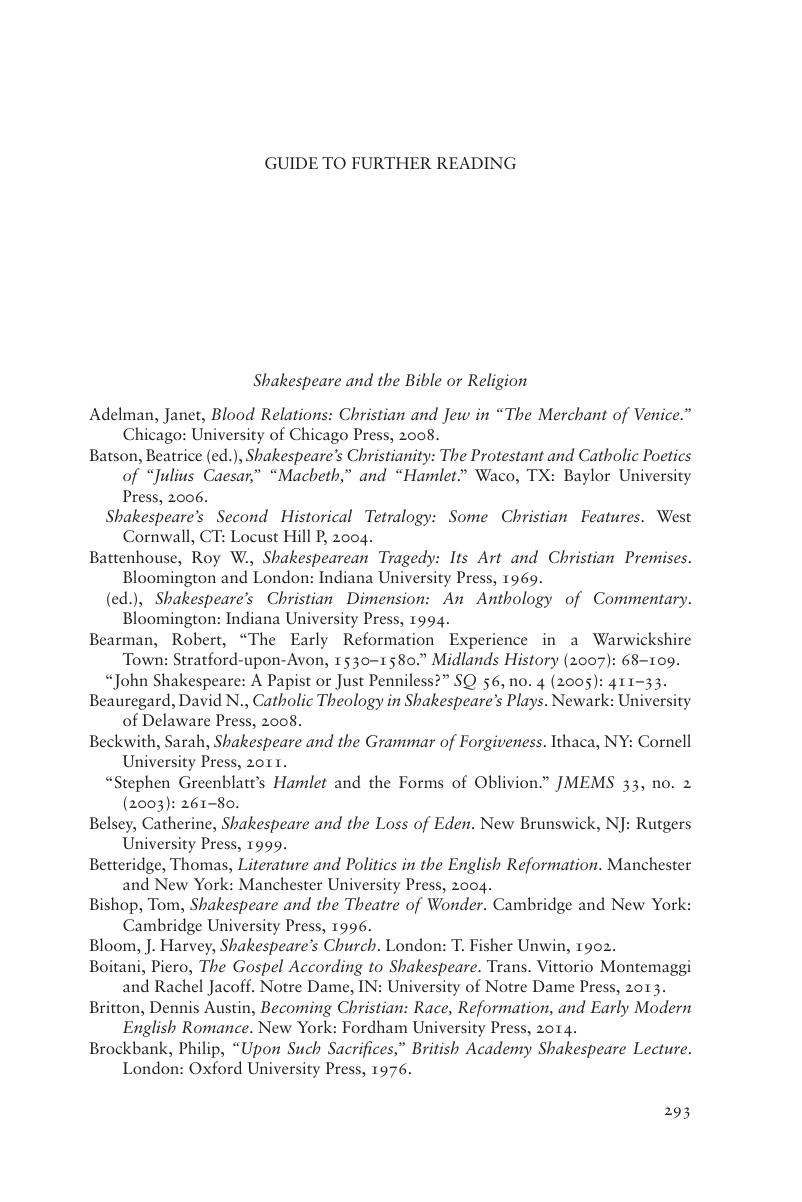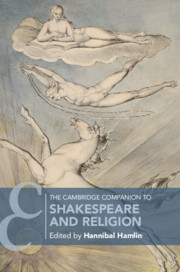Book contents
- The Cambridge Companion to Shakespeare and Religion
- The Cambridge Companion to Shakespeare and Religion
- Copyright page
- Contents
- Figures
- Contributors
- Preface
- A Note on the Texts
- Abbreviations
- 1 Shakespeare and the Elizabethan and Jacobean Church
- 2 Shakespeare: Biography and Belief
- 3 The Renaissance Bible
- 4 The Drama of the Liturgy
- 5 Popular Religion
- 6 Grace and Conversion
- 7 Love
- 8 Sin and Evil
- 9 Compassion, Affliction, and Patience
- 10 Providence and Divine Right in the English Histories
- 11 The Merchant of Venice, Jews, and Christians
- 12 Religious and Political Impasses in Measure for Measure
- 13 Remembering the Dead in Hamlet
- 14 Othello, Islam, and the Noble Moor: Spiritual Identity and the Performance of Blackness on the Early Modern Stage
- 15 Poetic Creation in an Apocalyptic Age: King Lear and the Making and the Unmaking of the World
- 16 Immortal Longings in Shakespeare’s Rome
- 17 Sacred and Theatrical Miracles in the Romances
- Afterword: Finding the Remedy
- Guide to Further Reading
- Index
- Cambridge Companions To …
- References
Guide to Further Reading
Published online by Cambridge University Press: 12 April 2019
- The Cambridge Companion to Shakespeare and Religion
- The Cambridge Companion to Shakespeare and Religion
- Copyright page
- Contents
- Figures
- Contributors
- Preface
- A Note on the Texts
- Abbreviations
- 1 Shakespeare and the Elizabethan and Jacobean Church
- 2 Shakespeare: Biography and Belief
- 3 The Renaissance Bible
- 4 The Drama of the Liturgy
- 5 Popular Religion
- 6 Grace and Conversion
- 7 Love
- 8 Sin and Evil
- 9 Compassion, Affliction, and Patience
- 10 Providence and Divine Right in the English Histories
- 11 The Merchant of Venice, Jews, and Christians
- 12 Religious and Political Impasses in Measure for Measure
- 13 Remembering the Dead in Hamlet
- 14 Othello, Islam, and the Noble Moor: Spiritual Identity and the Performance of Blackness on the Early Modern Stage
- 15 Poetic Creation in an Apocalyptic Age: King Lear and the Making and the Unmaking of the World
- 16 Immortal Longings in Shakespeare’s Rome
- 17 Sacred and Theatrical Miracles in the Romances
- Afterword: Finding the Remedy
- Guide to Further Reading
- Index
- Cambridge Companions To …
- References
Summary

- Type
- Chapter
- Information
- The Cambridge Companion to Shakespeare and Religion , pp. 293 - 300Publisher: Cambridge University PressPrint publication year: 2019

